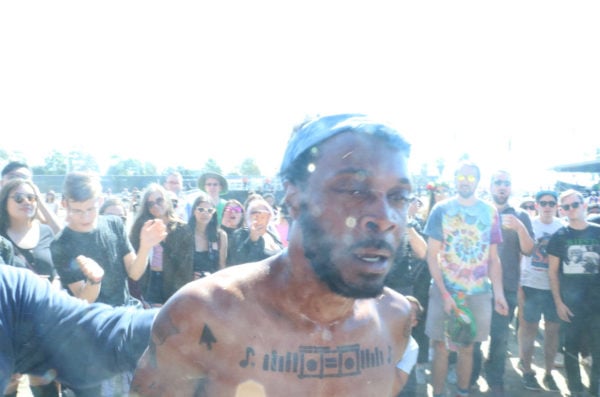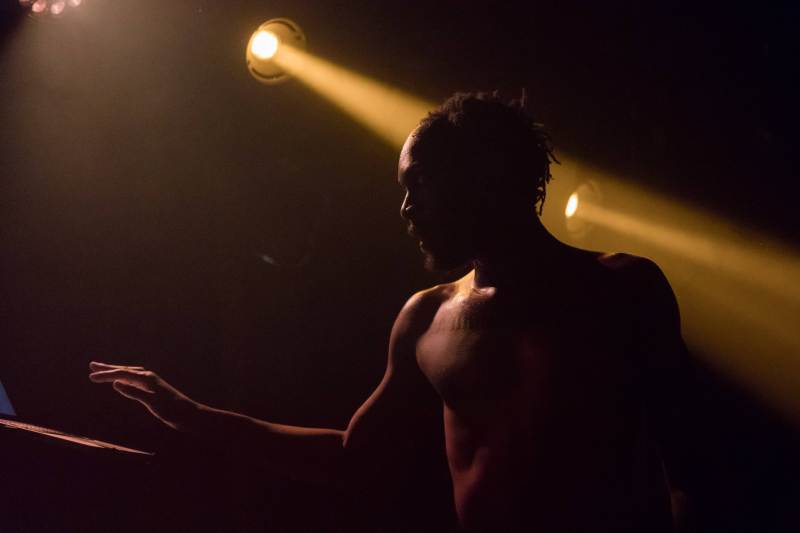
In an interview ranging from new music to our favorite 90s Nickelodeon cartoons, The Stanford Daily got a chance to speak with rapper JPEGMAFIA over the phone on his birthday while he was eating at Chili’s. Coming off of the success of his new project “Veteran,” JPEGMAFIA and his deconstructed take on trap music has seen the stage at numerous festivals, including the recent Treasure Island Music Festival in Oakland. He’s also been hard at work on new music, telling The Daily that he plans to release a loose single called “Puff Daddy” on November 7. “Puff Daddy” is produced by Kenny Beats, who is just coming off of producing Vince Staples’ “FM!”
This transcript has been lightly edited.
TSD: I want to start off this interview with the beginning for you. When did you start rapping and making beats?
JPEG: I think I started when I was 14, 15. I started making beats after I heard The Diplomats, Cam’ron and all those dudes making sample-based beats. I didn’t understand sample-based beats at the time, so I spent most of my time trying to figure out how they made that chipmunk noise, and then I realized they were sampling other music. That was fascinating to me, and that’s when I started producing.
I think I started rapping when I was 17 when I first heard Ice Cube. I wanted to rap about political stuff, but I didn’t know you could rap about it and not be all head-ass and conscious and like “Read books, n––.” You could just talk about whatever you want.
TSD: That’s actually something I wanted to touch on. You’re a very vocal and political rapper, which has become a very interesting role as time has passed and hip hop has morphed. Given the election of Donald Trump and the public rise of the alt right, hip hop is in an interesting spot right now. Obviously hip hop is rooted in politics and protest, but now it’s the most popular genre in America, so I was wondering how you navigate being a political rapper, especially during these times.
JPEG: I think you’re right. It’s interesting we’re in a weird time right now, especially with [politics]. All the climates, every form of entertainment, every form of everything is in a weird paradigm-shifting moment right now. I think hip hop is at a stage where it’s shifting to something else. I don’t know what it is, but I’m interested to see where it goes. I was just thinking about this the other day: Hip hop is now the most popular genre in the country. It has overtaken; it has now become the mainstream. [Hip hop] is now pop music.
I think the way I navigate [being a political rapper] is trying to approach it from the Ice Cube perspective. Ice Cube was very mainstream, very popular, very brash and very unapologetic, and a lot of people respect Ice Cube to this day. The way I maneuver is, well, I’m just here, man. I’m just reporting it and living in it. I’m actively here with you.
TSD: From “Communist Slow Jams” to your most recent “Veteran,” you obviously have an experimental and engaging production style, so how did you develop this aesthetic?
JPEG: Just naturally. It’s just an amalgam of who I am now. Amalgam? What’s the word I’m looking for? Amalgam … Amalgamation! Amalgam, that’s such a dumbass word. Who I am now is an amalgamation of all my past experiences living in the South, the inner city in New York, deep bumfu— nowhere in the trenches in Baltimore or being in the desert in the f—ing Iraq war. All of that encompasses how I developed [my sound] naturally. I’ve just been a lot of places I guess.
TSD: I want to dive a little deeper into that because it’s literally the name of your album “Veteran.” How has your background as a veteran influenced your music?
JPEG: It affected it in a way that it gave me a rigorous work ethic, nothing really more. It didn’t really affect [my music] creatively because when I was in the military, I didn’t really learn anything new. I learned things I already knew, like I learned work ethic and how to have a routine, that kind of thing. The only real thing I took away from the military is that it just reinforced all the things I already thought about the underbelly of America, like how racist it is. So, it didn’t really affect my music literally, but it affected the way I work on it.
TSD: Now I want to ask you about “Veteran,” which was obviously a huge success for you. In your opinion, what is the difference between your new record and your previous releases like “Black Ben Carson” and “Communist Slow Jams?”
JPEG: All my albums are like snapshots of where I am as a person at the time. “Black Ben Carson” is definitely more angry and harsh because I was really broke in Baltimore. With “Veteran,” I think the difference with the older [records] is that, with those, I think I had an idea of what I wanted. But with “Veteran,” I didn’t. I just kind of made whatever I wanted to at the time, and that’s why it’s all over the place. It’s literally a snapshot of what I was doing at the time.
TSD: “Veteran” definitely pulls from a lot of places as well. What influences did you have in mind for “Veteran?”
JPEG: I listened to a lot of anime soundtracks when I was making it originally. Also country music, Miranda Lambert, “The Life of Pablo.” When I take from my influences, it’s rare that I do it literally. I feel like when people take their influences, they wear them like skin. For me, taking influence means I’m listening to something and think it’s cool, and then maybe one day I’m working on something of my own. It’s just a feeling I get from [my influences] that I’m trying to replicate in the music when I’m making it.

TSD: Now I want to ask you about your live performances. Either under your current JPEGMAFIA name or something else, what was that first show like for you?
JPEG: My first live performance was when I was in the military. I went to some bar, and they had open mics. You could just sign up and perform. Nobody cared. Nobody liked it. The people were very hostile, and I was rapping about political shit. So my intro to performances was being booed, so being cheered now is cool. It’s a nice change of pace.
TSD: Maybe it was a good humbling experience to be booed first so now the cheering sounds way better. So before I close out, I’d really like to ask you what up-and-coming artists you’re enjoying right now.
JPEG: My homie Butch Dawson from Baltimore. Got another homie CRASHprez. Fire. From Wisconsin of all places. Who else is coming up? I have to look at my damn phone… There’s this new n––, his name is Kendrick Lamar.
TSD: Oh yeah, I’ve heard good things.
JPEG: Nah, I’m just playing. There’s also Snail Mail from Baltimore as well.
TSD: Awesome. So to wrap up the interview, what’s the next direction you’re thinking of taking your music? Should we expect new music soon?
JPEG: I mean my next album is going to be nothing but straight ABBA covers.
TSD: You could call it Mamma Mia 3!
JPEG: That would be insane. What if I made that, and it was actually fire though? But when I’m ready to drop, I’ll drop. I’ll be around. I have some new shit coming. Nothing but throat music. I am dropping a song on the seventh though. It’s called “Puff Daddy.” Kenny Beats produced it. It’s a loose single; it’s not going to be on an album or nothing. I just wanted to put some shit out.
TSD: Great! Well thank you so much for your time, so you can get back to doing what you’re doing.
JPEG: Yeah man, I’m at Chili’s. It’s my birthday.
TSD: Happy birthday! Thank you for taking this call!
JPEG: I appreciate it. I’m old, man. How old are you?
TSD: I’m 20. I’m a junior.
JPEG: Damn. You were born in 1998?
TSD: Yeah, 1998.
JPEG: Bro, I’m 29. I was born in 1989. I literally watched Rocko’s Modern Life on live television. I’m f—ing old. I literally saw new episodes of Rugrats.
TSD: I know I’m young because I watched Rocko’s Modern Life and Rugrats on Boomerang.
JPEG: Oh my god, I watched that show on Nickelodeon. I used to come home and go, “Oh, Rocko’s is on. Let’s go!” I remember when Catdog first came out. Y’all remember Catdog?
TSD: Yeah, who doesn’t love Catdog?
JPEG: Yeah, kind of random, but I appreciate [the interview].
TSD: No problem. Can’t wait for the new music. Thank you so much.
Contact Dylan Grosz at dgrosz ‘at’ stanford.edu
